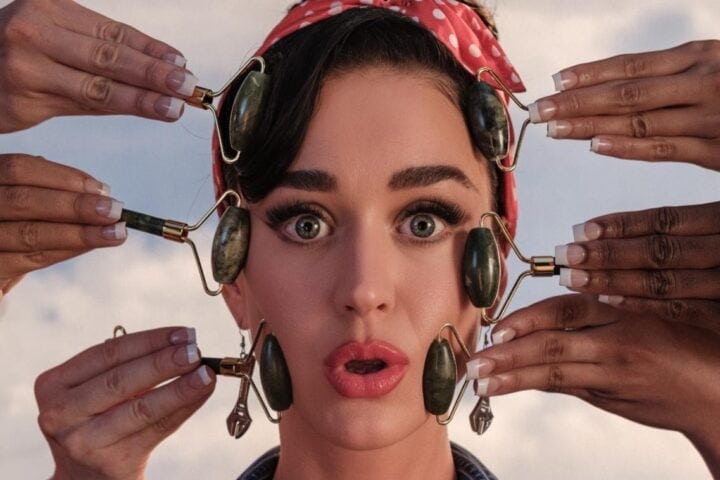The release of Katy Perry’s and Taylor Swift’s new albums within the span of just a few weeks highlights a distinct difference between their approaches. Perry initially sidestepped a traditional release strategy, dropping standalone singles over the course of a year before finally announcing Smile in July (the “fan edition” will include all six pre-release songs). Swift, on the other hand, eschewed convention altogether by releasing her eighth album, Folklore, with little warning—an approach that, as Billboard pointed out, inoculated the highly personal, indie-inflected album from commercial expectations.
Perry, too, has taken a more personal tack. Many of the songs on Smile find her reflecting on her life and career, with a recurring theme of self-empowerment threaded through songs like “Daisies” and “Teary Eyes.” At one point, Perry declares, “You might see a cliff, but I see a way to fly/Flipping off the flop, now I just enjoy the ride,” a lyric that both serves as a mission statement and suggests a newfound sense of freedom in the aftermath of the singer’s recent creative misfires. Perry is likely referring to a personal hardship when, on “Smile,” she quips, “Had a piece of humble pie/That ego-check saved my life,” but she could just as well be addressing the underwhelming performance of 2017’s Witness.
This self-reflection, however, is too often accompanied by by-the-numbers pop that puts the more adventurous, if uneven, Witness in stark relief. Swedish producer Oscar Holter lends “Cry About It Later”—on which Perry endorses the postponement of sorrow in favor of short-term pleasure—the same rollicking freneticism he and Max Martin brought to the Weeknd’s “Blinding Lights,” while “Never Really Over” boasts one infectious refrain after the next, gradually building on each other in ways reminiscent of Perry’s best-crafted hits. But tracks like “Teary Eyes” and “Champagne Problems” trade in the kind of basic, repetitive hooks that have lamentably become de rigueur in mainstream pop. Though “Daisies” aims for euphoric, “Teenage Dream”-style heights, it never quite reaches them, and the success of “Not the End of the World” rests almost entirely on a melody lifted from Steam’s 1969 hit “Na Na Hey Hey Kiss Him Goodbye” and the track’s similarities to Perry’s own “Dark Horse.”
With its peppy brass, turntable scratches, and indefatigable optimism, the title track feels, if not timeless, then unmoored from the current moment. Which is emblematic of Smile as a whole: Rather than build on any of the sounds she experimented with in the past, Perry seems content to stay in her lane when, at this point, she has nothing to lose. The folky closing track, “What Makes a Woman,” points to a promising new direction for Perry, but it comes too late and ends too soon—which is a fitting description for the album itself.
Since 2001, we've brought you uncompromising, candid takes on the world of film, music, television, video games, theater, and more. Independently owned and operated publications like Slant have been hit hard in recent years, but we’re committed to keeping our content free and accessible—meaning no paywalls or fees.
If you like what we do, please consider subscribing to our Patreon or making a donation.





